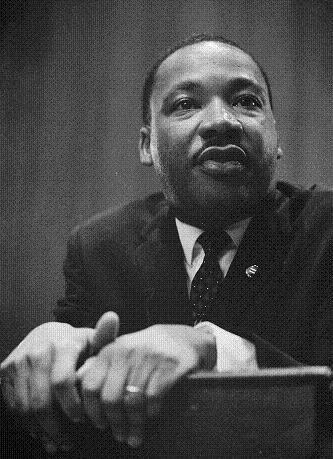
Source: Library of Congress
Each Monday, “Science and the Sacred” features an essay from one of the
BioLogos leaders: Francis Collins, Karl Giberson and Darrel Falk.
Today’s was written by Dr. Francis Collins.
I recently read some published sermons by the Rev. Martin Luther King, Jr. The depth and breadth of his eloquent defense of truth and justice are profoundly inspiring. My favorite of his sermons begins with a verse from Matthew: “Be ye therefore wise as serpents, and harmless as doves.” This exhortation must have seemed paradoxical to Christ’s followers — as it does to us — but Dr. King explains the real meaning: We are called to have both a tough mind and a tender heart, and we must be careful about when to apply each one.
By its very nature, science must be tough minded. Conclusions about how nature works must be arrived at by rigorous experimentation and development of theories that bring together numerous observations into a coherent structure. Even after a conclusion is reached, there must be intense skepticism about whether the theory is right. Scientists always seek to improve their theories, and, when necessary, overturn them. Whether deducing how the cell copies DNA or determining if a new drug for cancer actually works, there is no place for soft mindedness in science. Scientists are most definitely called to be as wise as serpents.
But what about those aspects of human existence that don’t have to do with understanding and controlling the material world? What about the bonds of trust and concern for family and friends, the tenderness of lovers, the calling we all experience to reach out to those less fortunate, and the spiritual impulse to seek something sacred that is greater than ourselves? If tough mindedness is the only attitude we bring to life, then our experiences in these other profoundly important areas will be impoverished.
The need for balance between head and heart is apparent when we look at the tension between the scientific and spiritual worldviews, especially in the United States. New Atheists hold science as a club over the heads of people who believe in God, implying that even considering the possibility of God reveals an inferior intellect. At the other extreme, fundamentalist believers discount scientific findings that violate their particular interpretation of the Bible, even if the meaning of those Scripture verses has been debated among devout Christians for millennia.
Building on Dr. King’s message, I encourage scientists — especially those with a predilection for attacking people of faith — to continue their tough mindedness in their exploration of nature. But when it comes to matters like the existence of God, the experience of beauty and the meaning of love, they must realize the scientific method has limitations to answer the questions. The heart may be a better guide than the mind in these cases.
Let me also encourage people of faith –especially those who distrust science — to seek God’s truth with all their hearts. But Jesus reminded us to, “Love the Lord your God with all your heart, and all your soul, and all your mind.” That means taking the time to understand with our minds why scientists are so sure about conclusions like the age of the universe and the relatedness of living things through the process of evolution. We must not worry that this information somehow threatens God.
There is much good news here. Science and faith can indeed exist in harmony if we will just recognize the proper domain of each. Voicing that same theme of harmony between the tough mind and the tender heart, Dr. King quotes the 19th century German philosopher, Georg Wilhelm Friedrich Hegel: “Truth is found neither in the thesis nor the antithesis, but in an emergent synthesis that reconciles the two.”
Dr. Francis Collins is former director of the Human Genome Project and founder and president of The BioLogos Foundation.

